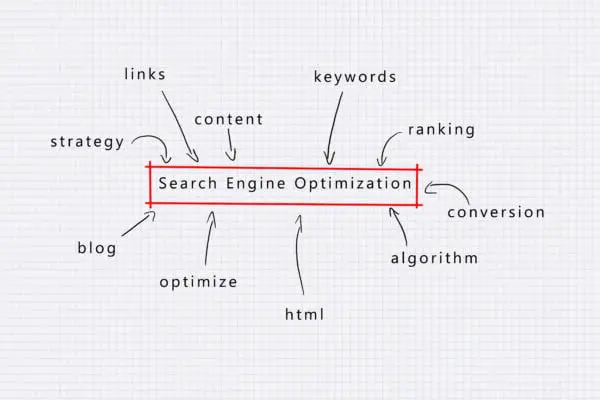

Google aims to give the user the perfect search results for any query. Their philosophy is to “Focus on the user and all else will follow.” Keeping Google’s goal in mind will help you BE the best result for the user. Understanding and adhering to Google’s mission can significantly impact your website’s performance in search engine rankings. By prioritizing SEO ranking factors aligning with Google’s user-centric approach, you can position your website as the best result for user queries.
What are Primary SEO Ranking Factors?
1. CONTENT
Search Engine Optimization is about getting found on Google. What makes up a website? There’s the content on the site, typically your services. Your site’s content is important because you get a chance to get inside the head of the customer. For example, if you sell Polyurethane, shellac, or varnish, chances are your potential clients aren’t looking up those exact words to find your services. What they are most likely searching for is “wood stains, “finishing coats,” or “top coats for furniture.” You should be trying to use those words in your content.
2. USER EXPERIENCE
To be the best result, these pages should also be helpful to the user. Does it answer the questions they might have about your services? Prices? Location? Or how to get in contact with you? Is your website mobile-friendly? Is the “contact us” button or phone number easily found, and where does the user expect it to be?
3. TECHNICAL SEO
Another important factor in technical SEO is your site speed, or how long it takes for your website to load on the user’s desktop, mobile device or tablet. You can check this easily by dropping your website’s link into Google’s PageSpeeds Insights. Your site’s speed can affect the bounce rate: the percentage of visitors to a particular website who navigate away from the site after viewing only one page. A couple of seconds may not seem like a long time but it can make all the difference between someone choosing between your site and another’s that loaded instantly.
Keeping this in mind is important during the web design process. Loud and flashy sites are pretty and all but think about how much code went into create that. Google needs to “crawl” your site too, and that is a lot to get through. If your page takes too long to load making the bounce rate high, Google will be less likely to show your site as the first result as it may not be the best result for the user.
What is the Most Important SEO Ranking Factor Related to On-Page Content?
The most important SEO ranking factor related to on-page content is relevance. Your content must be highly relevant to the search queries of your target audience. This involves using relevant keywords and phrases your audience will likely use when searching for products, services, or information related to your industry. Additionally, ensuring that your content provides valuable and informative answers to common questions within your niche further enhances its relevance. Ultimately, focusing on relevance in your on-page content can improve your chances of ranking higher in search engine results pages and attracting more organic traffic to your website.
Conclusion
In conclusion, Presentation Multimedia is dedicated to partnering with you every step of the way to ensure your online success. With our expertise in SEO in Westchester and best digital marketing practices, we are committed to helping your business thrive in the competitive online landscape. Whether you need assistance with search engine optimization, web design, mobile web design, mobile apps, or online reputation management, our team is here to provide tailored solutions that align with your goals and drive tangible results. For inquiries or to discuss how we can elevate your online presence, please don’t hesitate to contact us at 914-788-1555. Let’s embark on this journey together towards achieving prominence on page one of search results and maximizing your digital marketing potential in Westchester.
FAQ’s
Q: How can I ensure my website’s content is relevant to my target audience?
A: Conduct thorough keyword research to understand what terms your audience is searching for. Tailor your content to address their needs, pain points, and interests.
Q: Why is user experience important for SEO, and how can I improve it on my website?
A: User experience (UX) is vital because search engines prioritize websites that offer a positive experience. To enhance UX, focus on intuitive navigation, fast loading times, mobile responsiveness, and clear calls-to-action.
Q: What are some techniques to optimize my website’s speed for better SEO performance?
A: Minimize image and code file sizes, enable browser caching, utilize content delivery networks (CDNs), and reduce unnecessary redirects. Regularly test your website’s speed using tools like Google PageSpeed Insights.
Q: How do I effectively identify and incorporate relevant keywords into my content?
A: Use keyword research tools to discover relevant terms related to your industry and offerings. Integrate these keywords naturally into your content, including headings, meta descriptions, and body text.
Q: What common mistakes to avoid in web design that could impact SEO?
A: Avoid excessive Flash content, complex navigation structures, non-responsive design, and slow-loading pages. Ensure your website is accessible to both users and search engine crawlers.
Q: How does Google determine which websites to rank higher in search results?
A: Google uses complex algorithms considering relevance, authority, user experience, and technical optimization. Websites with high-quality content, strong backlinks, and positive user engagement rank higher.
Q: What are the benefits of having a mobile-friendly website for SEO?
A: Mobile-friendly websites provide a better user experience for visitors accessing your site from smartphones and tablets. Google prioritizes mobile-friendly sites in search results, leading to higher visibility and traffic.
Q: How can I measure the effectiveness of my SEO efforts and track improvements over time?
A: Utilize tools like Google Analytics to monitor organic traffic, keyword rankings, click-through rates, and conversion metrics. Regularly review your SEO performance to identify areas for improvement and adjust your strategies accordingly.



